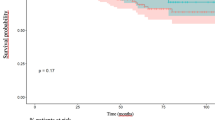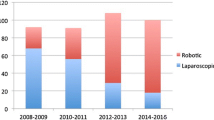Abstract
Purpose
The aim of this study was to investigate outcome after robot-assisted rectal cancer surgery (RARCS). We focused on conversion rate, postoperative complications, pathological evaluation (adequacy of resection margins), and bowel function (low anterior resection syndrome (LARS)) 1 year after surgery.
Methods
An observational study of prospectively registered patients with data obtained from medical records. Data comprise the initial 208 rectal cancer patients operated with robot-assisted surgery at a single Danish university hospital from October 2011 to October 2014.
Results
In total, 27 procedures (13%) were converted to open surgery, and 23 of the 27(85%) conversions were in the obese and overweight patients. The anastomotic leak rate was 12 (9%), and further 5 (2%) developed a complication requiring re-operation (ileus, bleeding, wound abscess). In total, 14 (7%) patients had a circumferential resection margin (CRM) ≤ 1 mm (R1-resection). In regard to bowel function, 15/22 (68%) of TME patients had major LARS at 6 months follow-up but at 12 months follow-up this proportion was reduced to 18/34 (53%).
Conclusions
The outcomes after RARCS at a single high-volume university center are overall comparable to outcomes reported from laparoscopic surgery. The results are satisfying because they are achieved during implementation of RARCS. Randomized trials are, however, needed and focus should especially be on long-term follow-up in regard to functional outcome.


Similar content being viewed by others
References
Ortiz-Oshiro E, Sanchez-Egido I, Moreno-Sierra J, Perez CF, Diaz JS, Fernandez-Represa JA (2012) Robotic assistance may reduce conversion to open in rectal carcinoma laparoscopic surgery: systematic review and meta-analysis. Int J Med Rob 8:360–370
Yang Y, Wang F, Zhang P, Shi C, Zou Y, Qin H, Ma Y (2012) Robot-assisted versus conventional laparoscopic surgery for colorectal disease, focusing on rectal cancer: a meta-analysis. Ann Surg Oncol 19:3727–3736
Lin S, Jiang HG, Chen ZH, Zhou SY, Liu XS, Yu JR (2011) Meta-analysis of robotic and laparoscopic surgery for treatment of rectal cancer. World J Gastroenterol 17:5214–5220
Baik SH, Ko YT, Kang CM, Lee WJ, Kim NK, Sohn SK, Chi HS, Cho CH (2008) Robotic tumor-specific mesorectal excision of rectal cancer: short-term outcome of a pilot randomized trial. Surg Endosc 22:1601–1608
Gomez Ruiz M, Alonso Martin J, Cagigas Fernandez C, Martin Parra JI, Real Noval H, Martin Rivas B, Toledo Martinez E, Castillo Diego J, Gomez Fleitas M (2016) Short- and mid-term outcomes of robotic-assisted total mesorectal excision for the treatment of rectal cancer. Our experience after 198 consecutive cases. Eur J Surg Oncol 42:848–854
Collinson FJ, Jayne DG, Pigazzi A, Tsang C, Barrie JM, Edlin R, Garbett C, Guillou P, Holloway I, Howard H, Marshall H, McCabe C, Pavitt S, Quirke P, Rivers CS, Brown JM (2012) An international, multicentre, prospective, randomised, controlled, unblinded, parallel-group trial of robotic-assisted versus standard laparoscopic surgery for the curative treatment of rectal cancer. Int J Color Dis 27:233–241
In:. http://www.dccg.dk/retningslinjer/indeks.html accessed 28.01.15
Heald RJ, Husband EM, Ryall RD (1982) The mesorectum in rectal cancer surgery—the clue to pelvic recurrence? Br J Surg 69:613–616
Christensen HK, Thaysen HV, Rodt SA, Carlsson P, Laurberg S (2011) Short hospital stay and low complication rate are possible with a fully implemented fast-track model after elective colonic surgery. Eur Surg Res 46:156–161
Dindo D, Demartines N, Clavien PA (2004) Classification of surgical complications: a new proposal with evaluation in a cohort of 6336 patients and results of a survey. Ann Surg 240:205–213
Schmiegelow AF, Broholm M, Gogenur I, Fode M (2016) Evaluation of sexual and urinary function after implementation of robot-assisted surgery for rectal cancer: a single-center study. Surg Laparosc Endosc Percutan Tech 26:141–145
Park SY, Choi GS, Park JS, Kim HJ, Ryuk JP, Yun SH (2014) Urinary and erectile function in men after total mesorectal excision by laparoscopic or robot-assisted methods for the treatment of rectal cancer: a case-matched comparison. World J Surg 38:1834–1842
Emmertsen KJ, Laurberg S (2013) Impact of bowel dysfunction on quality of life after sphincter-preserving resection for rectal cancer. Br J Surg 100(Rectal Cancer Function Study Group):1377–1387
DCCG aarsrapport. In:. http://www.dccg.dk/pdf/Aarsrapport_2014.pdf assesed 04 02 16
Emmertsen KJ, Laurberg S (2012) Low anterior resection syndrome score: development and validation of a symptom-based scoring system for bowel dysfunction after low anterior resection for rectal cancer. Ann Surg 255:922–928
Hellan M, Ouellette J, Lagares-Garcia JA, Rauh SM, Kennedy HL, Nicholson JD, Nesbitt D, Johnson CS, Pigazzi A (2015) Robotic rectal cancer resection: a retrospective multicenter analysis. Ann Surg Oncol 22:2151–2158
Pai A, Marecik SJ, Park JJ, Melich G, Sulo S, Prasad LM (2015) Oncologic and clinicopathologic outcomes of robot-assisted total mesorectal excision for rectal cancer. Dis Colon Rectum 58:659–667
Jayne DG, Thorpe HC, Copeland J, Quirke P, Brown JM, Guillou PJ (2010) Five-year follow-up of the Medical Research Council CLASICC trial of laparoscopically assisted versus open surgery for colorectal cancer. Br J Surg 97:1638–1645
de Souza AL, Prasad LM, Ricci J, Park JJ, Marecik SJ, Zimmern A, Blumetti J, Abcarian H (2011) A comparison of open and robotic total mesorectal excision for rectal adenocarcinoma. Dis Colon Rectum 54:275–282
Andersen P, Andersen LM, Iversen LH (2015) Iatrogenic ureteral injury in colorectal cancer surgery: a nationwide study comparing laparoscopic and open approaches. Surg Endosc 29:1406–1412
van der Pas MH, Haglind E, Cuesta MA, Furst A, Lacy AM, Hop WC, Bonjer HJ, COlorectal cancer Laparoscopic or Open Resection II (COLOR II) Study Group (2013) Laparoscopic versus open surgery for rectal cancer (COLOR II): short-term outcomes of a randomised, phase 3 trial. Lancet Oncol 14:210–218
Stevenson AR, Solomon MJ, Lumley JW, Hewett P, Clouston AD, Gebski VJ, Davies L, Wilson K, Hague W, Simes J, ALaCaRT Investigators (2015) Effect of laparoscopic-assisted resection vs open resection on pathological outcomes in rectal cancer: the ALaCaRT randomized clinical trial. JAMA 314:1356–1363
Guillou PJ, Quirke P, Thorpe H, Walker J, Jayne DG, Smith AM, Heath RM, Brown JM, MRC CLASICC trial group (2005) Short-term endpoints of conventional versus laparoscopic-assisted surgery in patients with colorectal cancer (MRC CLASICC trial): multicentre, randomised controlled trial. Lancet 365:1718–1726
McDermott FD, Heeney A, Kelly ME, Steele RJ, Carlson GL, Winter DC (2015) Systematic review of preoperative, intraoperative and postoperative risk factors for colorectal anastomotic leaks. Br J Surg 102:462–479
Birbeck KF, Macklin CP, Tiffin NJ, Parsons W, Dixon MF, Mapstone NP, Abbott CR, Scott N, Finan PJ, Johnston D, Quirke P (2002) Rates of circumferential resection margin involvement vary between surgeons and predict outcomes in rectal cancer surgery. Ann Surg 235:449–457
Park JS, Huh JW, Park YA, Cho YB, Yun SH, Kim HC, Lee WY, Chun HK (2014) A circumferential resection margin of 1 mm is a negative prognostic factor in rectal cancer patients with and without neoadjuvant chemoradiotherapy. Dis Colon Rectum 57:933–940
Arezzo A, Passera R, Salvai A, Arolfo S, Allaix ME, Schwarzer G, Morino M (2015) Laparoscopy for rectal cancer is oncologically adequate: a systematic review and meta-analysis of the literature. Surg Endosc 29:334–348
Author information
Authors and Affiliations
Corresponding author
Ethics declarations
Conflict of interest
Sanne Harsløf, Anders Stouge, Sissel Ravn, Søren Laurberg, and Lene Hjerrild Iversen have no conflicts of interest or financial ties to disclose. Niels Thomassen has been a proctor; Intuitive Surgical since October 2013.
Rights and permissions
About this article
Cite this article
Harsløf, S., Stouge, A., Thomassen, N. et al. Outcome one year after robot-assisted rectal cancer surgery: a consecutive cohort study. Int J Colorectal Dis 32, 1749–1758 (2017). https://doi.org/10.1007/s00384-017-2880-y
Accepted:
Published:
Issue Date:
DOI: https://doi.org/10.1007/s00384-017-2880-y




